March 9, 2016
Edited by David Sanders
Specimen Days
1814– Taras Shevchenko, Ukraine, national poet/painter/prof of Kiev [NS], is born.
1892– Joseph Weinheber, Austria poet/writer (Adel und Untergang), is born.
1892– Vita Sackville-West, English novelist, poet (The Land) and gardener (Sissinghurst), is born.
1905– Rex Warner, English poet/writer (Wild Goose Chase), is born.
1910– Ed[uard] Hoornik, Dutch writer/poet (Survivor), is born.
1994– Charles Bukowski, author/poet, dies of leukemia at 73.

The years are too strickly measured, and life too short
For me to afford such bits of myself to my friends.
And what have I to give my friends in the last resort?
An awkwardness, a shyness, and a scrap,
No thing that's truly me, a bootless waste,
A waste of myself and them, for my life is mine
And theirs presumably theirs, and cannot touch.
—from “Days I Enjoy” by Vita Sackville-West (1892–1962)
“An awkwardness, a shyness, and a scrap, / No thing that’s truly me, a bootless waste,” — Vita Sackville-West (1892–1962)
World Poetry
Poetry and Silence: Iran's Kurds Tread the Line between Art and Activism
In a sleepy town in Iranian Kurdistan, people take off their winter coats. It is evening, and outside one can just about discern the silhouettes of the mountains that lead to the Turkish and Iraqi borders. Inside, some 60 people fill the small community centre with a clammy heat. But it is not just warmth they are after. They have come for poetry. For several hours, old ladies, moustached students and intellectuals share their latest compositions. With the guttural grace of Sôrani Kurdish, they evoke the smell of the homeland, its ragged mountaintops, and the wanderings of the lone peshmerga fighter. People hold their breath as friends approach their last lines.
The Bizarre Trial of a Poet in Myanmar

The Burmese poet Maung Saungkha does not have a tattoo of Myanmar’s President on his penis. At least, that is what he has told everyone who has asked him recently. He may soon have to prove it in court. The twenty-four-year-old’s anatomy became a matter of public interest on October 8th, of last year, when Saungkha posted a short poem, titled “Image,” to his Facebook page.
A Gay Iranian Poet Is Seeking Asylum In Israel
Iran—like many other countries in the region— is not known for being friendly towards its LGBT+ community. Homosexuality is very much illegal in the Islamic Republic, and those prosecuted for the “crime” can face severe punishment, including the death penalty. For this reason, Payam Feili, a gay Iranian poet, had every reason to flee his homeland. He writes about a number of issues, including freedom, equality, memories of his childhood, and his dreams for his nation—common topics for a poet. What might seem surprising about Feili is his choice of refuge: Israel.
Burmese poet Maung Saungkha may have to prove in court that he does not have a tattoo of Myanmar’s President on his penis.
Recent Reviews
Aeneid Book VI: Seamus Heaney’s Miraculous Return from Literary Afterlife
by Bernard O’Donoghue
Seamus Heaney was always a generous venerator of his literary predecessors and guides. For much of his career the most dominant of these predecessor works was Book VI of Virgil’s Aeneid, particularly after he began his visionary volume Seeing Things in 1991 with The Golden Bough, translating the passage early in the book when the Cumaean Sybil tells Aeneas how he can find the token that will give him passage to the afterlife, where he will meet his father, Anchises. Heaney occasionally let fall his wish to translate the whole of Book VI, but with his death, in 2013, the possibility seemed to have gone.
‘On This Day in Poetry History,’ by Amy Newman
by David Kirby
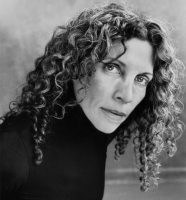
The artist’s job is “a continual extinction of personality,” T. S. Eliot said. Try telling that to John Berryman, Elizabeth Bishop, Robert Lowell, Sylvia Plath, Theodore Roethke, Delmore Schwartz and Anne Sexton, the subjects of Amy Newman’s dazzling new collection of poems, “On This Day in Poetry History.”
‘War Music,’ by Christopher Logue
by Jeffrey Brown
On Mount Olympus the gods are at it again. Bickering, back-stabbing. Thetis implores Zeus, on behalf of her son, the Greek hero Achilles. Hera, the wife and sister of Zeus (you know how families can be), demands that he back her favorites. Far below, on the plains stretching from Troy to the sea, mere mortals fight and suffer in a war that has gone on far too long and will be sung forever. But for now, all-powerful Zeus has had enough. And he lets Hera and the others know it with a threat that shuts them up and silences the world.
The Boys of Bluehill by Eiléan Ní Chuilleanáin
by Bethany W. Pope
Eiléan Ní Chuilleanáin’s The Boys of Bluehill is a masterly, muscular work that views personal history through the matched lenses of scholarship and imagistic description. Everything described here is dead, or dying. Everything described here is being reborn. In Ní Chuilleanáin’s hands, the skin is peeled back from commonplace life and beneath it is revealed the bloody, beating heart of myth.
Poetry in Motion
John Ashbery’s translation of Rimbaud provides inspiration for the Civilians.
by Hilton Als
“Collected French Translations,” the two-volume edition of the poet and critic John Ashbery’s work as a sensitive translator of French verse and criticism, published by Farrar, Straus, and Giroux in 2014, is essential reading not only if you’re interested in the esteemed poet but also if you share his interest in French cultural figures, ranging from Baudelaire to Redon and beyond. As a boy growing up in upstate New York, Ashbery was entranced by distant relatives who lived abroad. The glamour of expatriation was formative. In high school and, later, at Harvard, the burgeoning writer studied French and was excellent at it; he moved to France on a Fulbright in 1955, and lived in a number of towns before finally settling in Paris.
The Volatile I
by Johannes Göransson
In her book Dark Museum (2015), Argentinian critic and poet María Negroni provides this description of the Gothic: “Between ideology and crime, the Gothic opts for an epic of intensity, one that rehabilitates madness as a via negativa even as it posits improbability as an antidote to transcendence.” The darkly beautiful poems of the great Argentinian writer Alejandra Pizarnik (1936–1972) generate an immersive, Gothic atmosphere in which art is both violence and respite, contamination and antidote, hell and paradise. If it is true, as Calvin Bedient argues in “Against Conceptualism,” that we live in an era when “concept has trumped feeling,” then Pizarnik’s poetry is a welcome antidote—dramatic, brutally affecting, and saturated.
Berryman, Bishop, Lowell, Plath, Roethke, and Sexton, the subjects of Amy Newman’s, “On This Day in Poetry History.”
Broadsides
Lola Ridge: The Radical Modernist We Won't Forget Twice
by Terese Svoboda
In 1927 the Greenwich Village poet Lola Ridge was known to a huge public as the author of The Ghetto and Other Poems (1918), a book that portrayed the immigrant as human, struggling, but with hopes for the future. Nicola Sacco and Bartolomeo Vanzetti were two such immigrants, about to be executed in Boston for crimes they most likely did not commit. Ridge too was an immigrant—born in Dublin, she immigrated to New Zealand as a child and later traveled across the Pacific, first to San Francisco and eventually settling in New York. Her presence at the demonstration to free Sacco and Vanzetti—described above by Katherine Anne Porter—was announced in advance on the front page of major newspapers as an important witness to the event
So Even While
by Uche Nduka
To be a poet in capitalistic America is a rebellious act. When it comes to manifestos, I change the subject. Does the poem care whether you have expectations or not? Today I didn’t invent my reader. My reader invented me. Functioning, charging, exploring every crevice of a poem’s musicality and barraging its camouflage with questions.
Within a poem friendship and enmity touch each other. They invite every passerby to a conference. Gunshots are playbacks of metonymy. They are arguing a case outside my window that is, perhaps, inessential. Do spiderwebs think gunshots are important and necessary for poetry? But of course when I close my eyes I am inside a poem. And the gravel says it is imperfection that gives rise to a poem. Enigma bruises this room, that street, those gunshots.
To be a poet in capitalistic America is a rebellious act.
Drafts & Fragments
Anybody Want to Buy a Poetry Bookstore?
We just got an e-mail from John Marshall, the co-owner of Open Books in Wallingford. (If you’ve never been, Open Books is one of a handful of poetry bookstores in the United States. And also, shame on you for living in Seattle and never going to Open Books.) Here it is, in its entirety.
Crafton Woman Upset that Poetry Keeps Getting Stolen
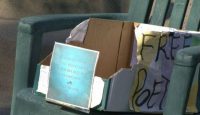
Season Ciechanowski makes no bones about it, poetry means something to her. "I've had a lot of grief and it's gotten me through a lot of really tough times, so the poetry box is there to give that to someone else that might need it," Ciechanowski says. The wife and mother to three in Crafton does a lot to spruce up her neighborhood, including poetry in a box.
Season Ciechanowski makes no bones about it, poetry means something to her.
Poetry In the News
Airea Matthews Is Named the Yale Younger Poet for her ‘rollicking, destabilizing’ Debut Collection

Airea D. Matthews, a Detroit-based poet and 2013 Pushcart Prize nominee, has been selected the 2016 Yale Younger Poet for her manuscript “simulacra.” The prize, the oldest annual literary award in the United States, is awarded by Yale University Press. Critically acclaimed poet Carl Phillips selected Matthews as the winner of the competition, which is open to emerging poets who have not previously published a book of poetry and who reside in the United States.
IU Bloomington Professor Ross Gay Wins Kingsley Tufts Poetry Award
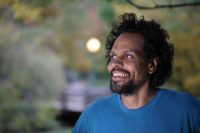
Indiana University professor Ross Gay is the winner of the 2016 Kingsley Tufts Poetry Award. One of the most prestigious awards in poetry, the honor carries with it a $100,000 prize. While many literary awards recognize a single published work or a successful writing career, the Kingsley Tufts Poetry Award was created to honor mid-career poets and provide them the means to continue working toward the pinnacle of their craft.
Right-to-die Advocate Says He Helped to Kill Island Poet Al Purdy
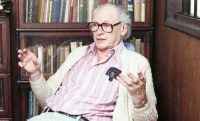
Victoria right-to-die advocate John Hofsess says he killed eight people who wanted to die, including Sidney poet Al Purdy. Hofsess, founder of the Right to Die Society of Canada, took his own life “as planned” in Switzerland on Monday. In an article in Toronto Life published the day after he died, Hofsess describes how he and retired office worker Evelyn Martens took part in the suicides of eight people between 1999 and 2001. Hofsess and Martens created an underground assisted-death service for society members, wrote Hofsess. Purdy was one of them.
Airea D. Matthews, a Detroit-based poet, has been selected the 2016 Yale Younger Poet for her manuscript “simulacra.”
New Books
From There: Some Thoughts on Poetry & Place by Stephen Burt
[Paperback] Ronsdale Press, 56 pp., $10.95
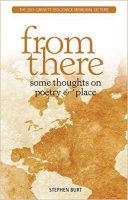
In his 2015 Garnett Sedgewick lecture, award- winning poet and literary critic Stephen Burt discusses the relation of poetry to time, space and place. He examines the widespread and popular view of contemporary critics who claim that modern lyric poetry is supposed to have a speaking self who resides outside of space and time, and addresses readers who do not care who or where they are. In other words, place or the "there" of the poems is supposed to have no importance to the lyric voice. But taking his examples from Chaucer onwards through Shakespeare, the landscape poets of the eighteenth century, and Wordsworth, along with a number of prominent Canadian poets such as Elise Partridge and Newfoundland's Mary Dalton, Burt shows that the lyric poem often relies importantly upon an attachment to place and time.
99 Poems: New & Selected by Dana Gioia
[Hardcover] Graywolf Press, 208 pp., $24.00
Dana Gioia has long been celebrated as a poet of profound intelligence and powerful emotion, with lines made from ingenious craftsmanship. 99 Poems: New & Selected for the first time gathers work from across his career, including a dozen remarkable new poems. Gioia has not ordered this selection chronologically. Instead, his great subjects organize this volume into broad themes of mystery, remembrance, imagination, place, stories, songs, and love. The result is a book we might live our lives alongside, and a reminder of the deep and abiding pleasures and reassurances that poetry provides us.
When We Were Birds: Poems by Joe Wilkins
[Paperback] University of Arkansas Press. 94 pp., $17.95
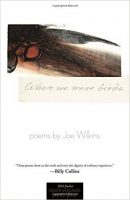
In When We Were Birds, Joe Wilkins wrests his attention away from the griefs, deprivations, and high prairies of his Montana childhood and turns toward “the bean-rusted fields & gutted factories of the Midwest,” toward ordinary injustice and everyday sadness, toward the imminent birth of his son and his own confusions in taking up the mantle of fatherhood, toward faith and grace, legacy and luck.
The Taxidermist's Cut by Rajiv Mohabir
[Paperback] Four Way, 112 pp., $15.95
The Taxidermist’s Cut is a collection that centers the pressures of being a queer brown youth awakening sexually in a racist, anti-immigrant matrix. As an Indo-Caribbean, the queer-countried speaker is illegible as an “Indian” as well as an “American.” Haunted by his migration narrative, the speaker tries to make himself fit into his environment by sloughing off his skin and stretching new ones over his body. At stake here is surviving a palimpsest of violence: violences enacted upon the speaker and violences the speaker enacts upon himself through cutting. Mohabir engages with the body and the land as a series of incisions and overlays to cover the damage of memory of a South Asian brown body dealing with aggressions and joys. This is a collection of twisted love stories-as-slits that exposes the meat and bone of trauma and relief. Drawing from outside source texts such as animal tracking guides and taxidermy manuals, these poems attempt to show the process of how to survive being erased on all fronts.
Blood Memory by Colleen J. McElroy
[Paperback] University of Pittsburgh Press, 128 pp., $15.95
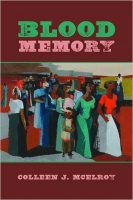
Blood Memory, Colleen J. McElroy's collection of narrative poetry, emerges from deep seated memories with enormous emotion. Through the rhythms and musicality unique to McElroy's voice, it portrays an extended family, a complex culture spanning several decades, multiple victories and failures, and a single brilliant soul that frames the poems. Dedicated to McElroy's mother, the book is universal in its scope, inescapable in its earthy particularity. McElroy writes, “I am the last female of a family/ of women who wove the fabric/ of stories into doilies and slip covers…/" Blood Memory offers consummate storytelling and unforgettable poetry capturing a place and time gone forever. And as an evolving history, the poetry has a cinematic quality, large and intimate and at the same time, characters utterly vivid.
Correspondences
Georgina Herrera Shares More than just Poetry
by Sarah Strausser
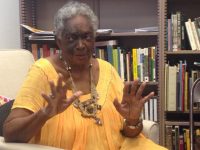
Georgina Herrera, Afro-Cuban poet, sits comfortably in an oversized cream colored chair in the quiet office of Trinity Hall 131. Her long and airy yellow top contrasts her deep colored skin and short gray hair. She takes a deep breath, surveys the room and then begins to answer questions. Without any background knowledge it would be hard to tell that Herrera is completely out of her element in this new world.
Why Grief is Political for Poet Muriel Leung
by Corinne Segal

Poet Muriel Leung learned early that language went hand in hand with power. Growing up as a non-native English speaker in Queens, New York, Leung spoke Cantonese with her family. But at school, she began to understand that learning English involved new types of power exchanges. “I was trying to wrestle in my mind with how language worked, especially when confronting authority figures who were very impatient with silence and wanted you to speak, and wanted you to speak in a particular way,” she said. “It was a lesson for me in the power of withholding.”
The Texture and Proximity of the Human Voice: An Interview with Carmen Giménez Smith
by Emilia Phillips
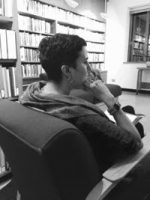
Carmen Giménez Smith is the author of the memoir Bring Down the Little Birds and four poetry collections: Milk and Filth, Goodbye, Flicker, The City She Was, and Odalisque in Pieces. Milk and Filth was a finalist for the NBCC Award in Poetry. She is the recipient of a 2011 American Book Award, the 2011 Juniper Prize for Poetry, and a 2011-2012 fellowship in creative nonfiction from the Howard Foundation. She recently co-edited the anthology Angels of the Americplyse: New Latin@ Writing (Counterpath, 2014). A CantoMundo Fellow, and she is the publisher of Noemi Press. She teaches in the creative writing MFA program at New Mexico State University.
Poet Muriel Leung learned early that language went hand in hand with power.
Envoi: Editor’s Notes
This week, I resisted the urge again to to post another story about the continuing saga surrounding the cause of Pablo Neruda's death in 1973. Instead, here is a poem by him.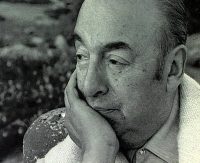
Walking Around
It so happens I am sick of being a man.
And it happens that I walk into tailorshops and movie houses
dried up, waterproof, like a swan made of felt
steering my way in a water of wombs and ashes.
The smell of barbershops makes me break into hoarse sobs.
The only thing I want is to lie still like stones or wool.
The only thing I want is to see no more stores, no gardens,
no more goods, no spectacles, no elevators.
It so happens that I am sick of my feet and my nails
and my hair and my shadow.
It so happens I am sick of being a man.
Still it would be marvelous
to terrify a law clerk with a cut lily,
or kill a nun with a blow on the ear.
It would be great
to go through the streets with a green knife
letting out yells until I died of the cold.
I don't want to go on being a root in the dark,
insecure, stretched out, shivering with sleep,
going on down, into the moist guts of the earth,
taking in and thinking, eating every day.
I don't want so much misery.
I don't want to go on as a root and a tomb,
alone under the ground, a warehouse with corpses,
half frozen, dying of grief.
That's why Monday, when it sees me coming
with my convict face, blazes up like gasoline,
and it howls on its way like a wounded wheel,
and leaves tracks full of warm blood leading toward the night.
And it pushes me into certain corners, into some moist houses,
into hospitals where the bones fly out the window,
into shoeshops that smell like vinegar,
and certain streets hideous as cracks in the skin.
There are sulphur-colored birds, and hideous intestines
hanging over the doors of houses that I hate,
and there are false teeth forgotten in a coffeepot,
there are mirrors
that ought to have wept from shame and terror,
there are umbrellas everywhere, and venoms, and umbilical cords.
I stroll along serenely, with my eyes, my shoes,
my rage, forgetting everything,
I walk by, going through office buildings and orthopedic shops,
and courtyards with washing hanging from the line:
underwear, towels and shirts from which slow
dirty tears are falling.
“It so happens I am sick of being a man.” – Pablo Neruda